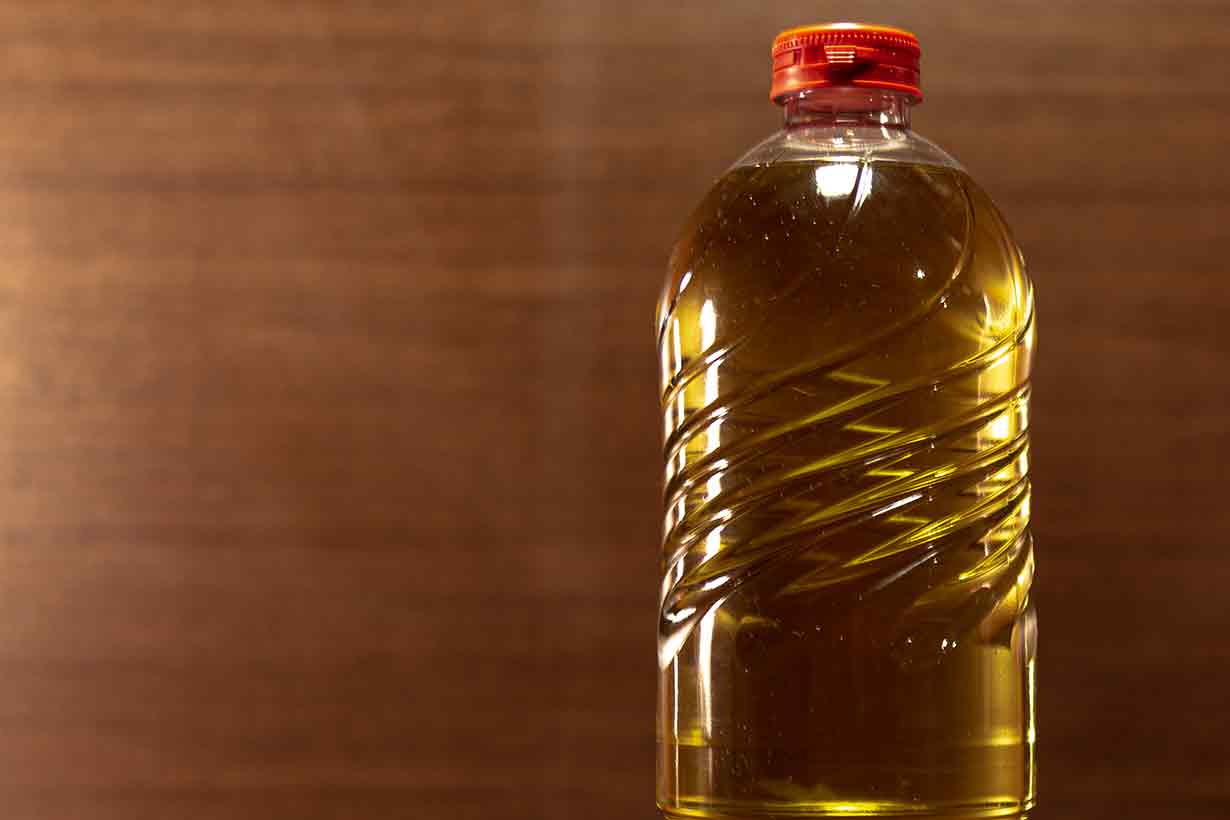Is cooking with seed oils bad for you?
It is common to see social media claims that linoleic acid-containing seed oils are “bad” for you.
However, is there any reliable evidence behind these claims?
This article reviews the evidence on seed oils and examines the findings from studies examining human health outcomes.
Table of contents
What Are Seed Oils?

Before looking at the scientific research on this topic, let’s first define what seed oils are.
Some people may know of them as ‘vegetable oils,’ but not all ‘vegetable’ oils come from seeds.
For example, coconut oil, olive oil, and avocado oil are sometimes called ‘vegetable oils.’ However, these oils come from fruit pulp and contain a very different fatty acid profile from seed oils.
In contrast, the oil in ‘vegetable’ seed oils is extracted directly from seeds. Some examples of seed oils include the following oils:
- Canola oil (also known as rapeseed oil)
- Corn oil
- Cottonseed oil
- Grapeseed oil
- Rice bran oil
- Safflower oil
- Sesame oil
- Soybean oil
- Sunflower oil
Each of these seed oils is primarily used as a cooking oil.
Each of these oils’ exact fatty acid profile varies, but linoleic acid tends to be the primary fatty acid. Linoleic acid is a polyunsaturated omega-6 fatty acid (1, 2).
In addition to seed oils, other primary dietary sources of linoleic acid include nuts and seeds.
Why Do Public Health Organizations Recommend Seed Oils?
Another important background point to note is that public health organizations recommend using seed oils.
In this regard, here are the positions of some of the most well-known health bodies on these oils:
- The American Heart Association: “Here’s an alphabetical list of common cooking oils that contain more of the “better-for-you” fats and less saturated fat: Canola, corn, olive, peanut, safflower, soybean, and sunflower” (2)
- Harvard Medical School: “The one that comes to mind first is olive oil. After that, corn, canola, sunflower, safflower, and soybean all fall into the healthy column” (3).
- Dietary Guidelines for Americans 2020-2025: “Commonly consumed oils include canola, corn, olive, peanut, safflower, soybean, and sunflower oils. Strategies to shift intake (of saturated fat) include cooking with vegetable oils in place of fats high in saturated fat, including butter, shortening, lard, or coconut oil” (4).
- National Health Service (NHS) UK: “Choose unsaturated oils and spreads, and eat them in small amounts” (5).
- Heart UK: “Unsaturated fats are more heart-healthy. They’re found in oils from vegetables, nuts, and seeds, such as sunflower, safflower, rapeseed, olive, peanut, walnut, and corn oil” (6).
Seed Oils Can Lower LDL-Cholesterol (LDL-C)
The reason why these organizations recommend unsaturated seed oils is primarily because these oils can lower LDL Cholesterol (LDL-C) (7, 8).
In contrast, cooking fats with a greater ratio of saturated fatty acids, such as butter, palm oil, and tallow, can increase LDL-C (9, 10, 11).
Higher levels of LDL-C are a marker for high levels of apolipoprotein B (Apo B), a protein thought to increase the risk of cardiovascular disease. High LDL-C and Apo B levels are strongly associated with a higher risk of cardiovascular disease (12, 13, 14).
Seed Oils and Oxidized Linoleic Acid Metabolites (OxLAMs)
One of the central negative claims people make about seed oils is that they are less stable than monounsaturated and saturated fats and can thus generate “toxic” oxidized metabolites.
There is some degree of truth to this.
This is because linoleic acid, as a polyunsaturated fatty acid, has multiple double bonds in its structure. These double bonds can react with oxygen and ‘oxidize,’ leading to the generation of oxidized byproducts (15).
Exposing cooking oils with a high proportion of linoleic acid to light, oxygen, and heat (particularly repeatedly cooking with the same oil) will increase the prevalence of these oxidized products.
Some such oxidized products are known as ‘oxidized linoleic acid metabolites’ (OxLAMS) (16, 17).
These OxLAMs include 9- and 13 hydroxy-octadecadienoic acid (known as 9- and 13-HODE) and 9- and 13-oxo-octadecadienoic acid (9- and 13-oxoODE) (18).
Animal studies suggest that OXLAMs may potentially have adverse health effects, such as leading to hepatic (liver) injury (19, 20, 21).
Additionally, a 2012 study showed that lowering the dietary intake of linoleic acid reliably decreased the number of circulating OXLAMs in human participants (18).
However, we now need to ask what data from human studies show on linoleic acid intake.
What Do Studies Involving Human Participants Show About the Health Effects of Seed Oils?
Let’s now look at the results from extensive studies involving human participants that examined the health effects of seed oils or linoleic acid.
It is important to note that linoleic acid doesn’t necessarily equal seed oils since other foods supply it (such as nuts and seeds).
However, vegetable seed oils are arguably the primary dietary source of linoleic acid, and the negative claims about seed oils focus on the proneness of linoleic acid to oxidation (22).
Inflammation
Effect of Dietary Linoleic Acid On Markers of Inflammation In Healthy Persons: a Systematic Review of Randomized Controlled Trials (2012)
A 2012 systematic review of fifteen randomized controlled trials (RCTs) involving 516 participants looked at trials lasting between two weeks and nine weeks to examine the link between dietary linoleic acid and markers of inflammation. After reviewing the data, the authors concluded that “virtually no evidence is available from randomized, controlled intervention studies among health, noninfant human beings to show that addition of linoleic acid to the diet increases the concentration of inflammatory markers” (23).
The doses of linoleic acid used in these fifteen RCTs ranged from a low of 5.8 grams per day to a high of 64.3 grams per day.
However, the authors did mention that “the possibility that large intakes of linoleic acid increase markers of inflammation cannot be eliminated” and that more extensive dose-response studies with a longer duration are required before making such a conclusion.
Dietary Linoleic Acid Intake and Blood Inflammatory Markers: a Systematic Review and Meta-analysis of Randomized Controlled Trials (2017)
A 2017 systematic review and meta-analysis of 30 randomized controlled trials involving 1377 participants had slightly different (but similar) findings. The RCTs included in this review lasted between four weeks and six months, and linoleic acid intake came from oils such as soybean oil and sunflower oil.
To summarize, this study’s findings were that increased linoleic acid intake didn’t significantly affect inflammatory markers in the blood. However, a more in-depth data analysis (via meta-regression analysis) indicated that “higher LA intake may shift the effect of LA towards increasing blood CRP concentration”. Despite this, “the effect did not reach statistical significance” (24).
CRP is an abbreviation for C-reactive protein, which is a protein found within the blood when levels of inflammation are higher. In other words, it is a marker of inflammation.
However, it is essential to note the limitations of this wording; the authors are not saying inflammation vastly increased at higher dietary intakes of linoleic acid. Instead, they are saying there were no significant impacts on inflammatory markers but that a trend was observed for one inflammatory marker (CRP) increasing at higher intake levels. Further, there was a lack of certainty about this effect; the strength of evidence was low as the effect didn’t reach statistical significance.
Chronic Disease and All-Cause Mortality
Two of the most important health outcomes to look at when analyzing the effect of any food or medication are chronic disease and all-cause mortality.
In this regard, what do human studies on seed oils and/or linoleic acid show us?
Associations of Dietary Fats With All-Cause Mortality and Cardiovascular Disease Among Patients With Cardiometabolic Disease (2022)
A 2022 study followed 8537 participants with cardiometabolic disease from the National Health and Nutrition Examination Survey (NHANES) cohort.
During a median follow-up of 10.3 years, there were 3506 all-cause deaths and 882 CVD deaths.
Compared to the lowest intake group, the group with the highest intake of linoleic acid had a 14% lower risk of all-cause mortality (25).
Dietary Intake and Biomarkers of Linoleic Acid and Mortality: Systematic Review and Meta-Analysis of Prospective Cohort Studies (2020)
A 2020 systematic review and meta-analysis analyzed forty-four prospective cohort studies, which involved (26):
- 811,069 participants who had dietary intake assessment
- 65,411 participants who had biomarker measurements of linoleic acid intake taken
Participants assessed as having the highest dietary linoleic acid intake compared to the lowest had a 13% lower risk of all-cause mortality, 13% lower risk of CVD mortality, and an 11% lower risk of cancer mortality.
Regarding the 65,411 participants who had blood biomarkers of linoleic acid intake taken, each standard deviation increment in linoleic acid concentrations in adipose tissue/blood resulted in a 9% lower risk of total mortality, an 11% lower risk for CVD mortality and a 9% lower risk for cancer mortality.
This extensive study showed that individuals with the highest linoleic acid intake – measured by dietary survey or actual tissue biomarkers of intake – had a moderately lower mortality risk from CVD, cancer, and all causes.
Does Cooking With Vegetable Oils Increase the Risk of Chronic Diseases? A Systematic Review (2015)
A 2015 systematic review examined whether cooking with vegetable oils increases the risk of chronic diseases. The review included twenty-three studies that were either cohorts, randomized controlled trials, or case-control studies (27).
Findings from this review included the following:
- Palm oil was associated with cardiovascular disease (CVD) risk
- Olive oil consumption, use of vegetable oils, and mustard oil consumption were found to be inversely associated with the risk of CVD.
Are Deep-Fried Foods Associated With Adverse Health Outcomes?
Finally, we will look at some research on deep-fried food intake and human health outcomes.
The current evidence on this topic suggests that limiting deep-fried food intake is a good idea.
Several large studies in this area have shown that fried food consumption increases the risk of obesity, cardiovascular disease, and cardiovascular and all-cause mortality (28, 29, 30, 31).
However, it is important to note here that although deep-fried foods often do contain linoleic acid/seed oils, nuance is required when clarifying the clear differences between the two:
- Health organizations and public health guidance tend to promote unsaturated fatty acids (including seed oils) but advise on limiting deep-fried foods.
- Deep-fried foods are more than oil: they are often high-energy foods that contain large amounts of calories, carbohydrates, and fat and are easy to over-consume.
- More research is necessary on the effects of oxidized linoleic acid metabolites on human health. Still, if they are deemed to be an issue, the use of cooking oils for long durations via industrial deep-frying (and potentially re-using the oils several times) is going to be vastly different from pan-frying at home for ten minutes.
- Seed oil intake (and fat/calorie intake) from deep-frying is likely significantly greater than a meal pan-fried at home.
Final Thoughts
It is easy to find claims that seed oils such as soybean oil and sunflower oil have negative effects on human health.
These oils can be prone to oxidation and generate oxidized byproducts when they break down. As mentioned, these byproducts have been associated with potential harm in mechanistic and animal studies.
However, the research into linoleic acid and seed oil intake in human participants shows health benefits rather than detriments. In this regard, several large studies show that greater linoleic acid intake lowers the risk of mortality from chronic disease and all-cause mortality.
To summarize, if seed oils (and, by extension: linoleic acid) negatively impact human health outcomes, there is a current lack of evidence to confirm this.








